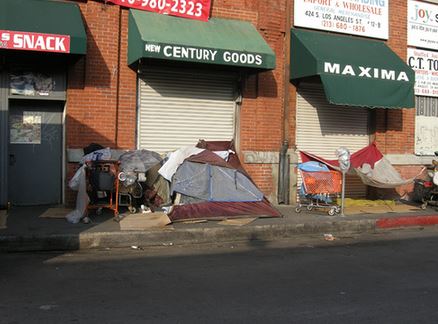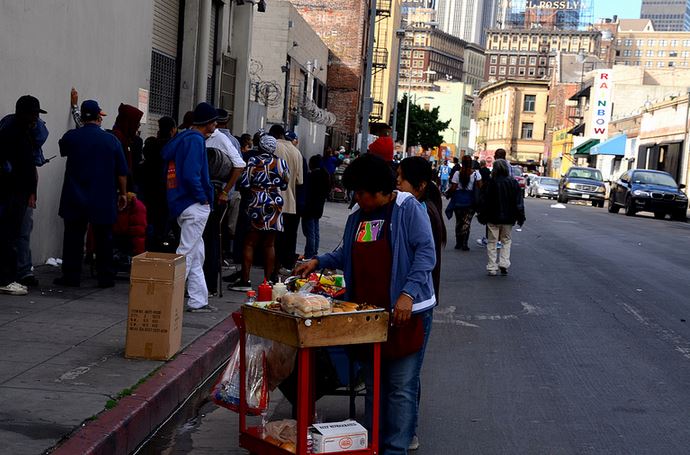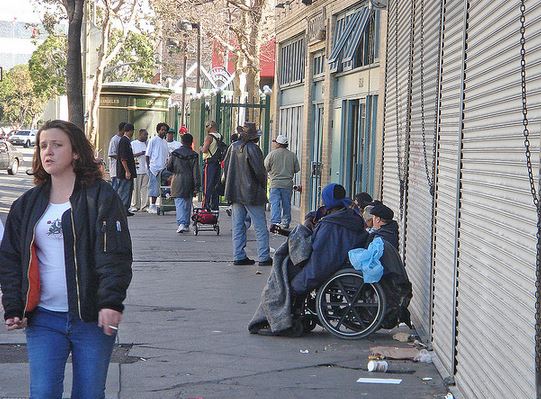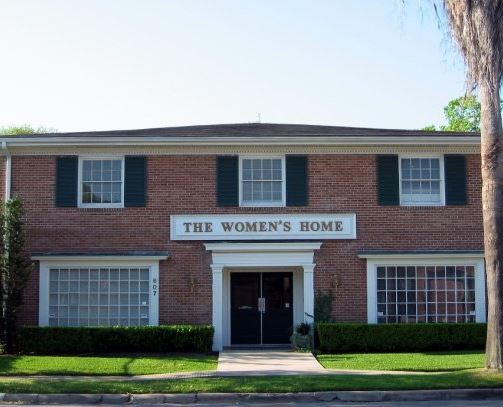The Uncomfortable, Taboo Reason Why Homeless Women Have It Harder

By:
Homelessness brings unimaginable challenges to the hundreds of thousands of people living without shelter in the United States. Not only do these individuals have a lower life expectancy, but women have to worry about being sexually assaulted as a result of their situation. On top of all that, droves of homeless women are forced to live without feminine care products that they need for their menstrual cycles, making it harder for them to feel clean, healthy, and confident enough to improve their lives.
Molly Moen, COO of the Downtown Women's Center in Los Angeles, told ATTN: that she's seen the hardships homeless women face to take care of a biological function that's still a taboo subject in our culture.
"For so many of our women, addressing those very basic needs is incredibly difficult when they are living on the street and don't have access to resources like clean bathrooms, the ability to take a shower, changes of clothes, access to feminine hygiene products," Moen told ATTN:. "[T]hose are things that are tremendously difficult when you're living on the street, particularly here in downtown Los Angeles. There aren't clean, safe public bathrooms. Certainly not enough of them."
The Downtown Women's Center draws about 4,000 homeless and extremely low-income women annually and is located in Skid Row, which attracts thousands of homeless people each year and has the highest concentration of homeless individuals in the U.S. (earlier this month, Skid Row made national news after police shot and killed a homeless person in the area). The drop-in day center serves 200 women daily by providing them with a broad range of services to get them on the path to personal stability. The day center provides showers, laundry, mail service, phones, and hot meals to those seeking help, and the Downtown Women's Center also provides medical care, housing, and professional preparation to women in need.
Skid Row: Zach Gibson/Flickr
Skid Row: Neon Tommy/Flickr
Skid Row: IK's World Trip/Flickr
Moen told ATTN: that homeless women are self-conscious because of their circumstances, which are made more difficult thanks the lack of access to feminine products, "They're not immune to all of the noise that goes on in the community, and the judgments that are made about homeless individuals. This sense that you're not able to address this basic, very personal need can be embarrassing to talk about and impact your self-esteem."
Alex Grandstaff, communications manager at treatment and transitional housing program The Women's Home in Houston, Tx., helped gather female residents' perspectives on the issue for ATTN:.
"Getting sanitary products was easy when I was homeless," said Cheryl W. of The Women's Home, which takes homeless women off the streets and assists them with various types of recovery. "However, keeping them was sometimes difficult. Other homeless people would steal or bully to get what they wanted."
The Women's Home/Facebook
Several of the women claimed they'd stopped menstruating, which can be caused by extreme stress, among other things. Many of them also said that although they no longer had trouble getting sanitary products thanks to The Women's House, it was not easy for them prior to joining this community.
"It is quite difficult, if not impossible, to have any access to products to care for personal hygiene such as soap or even toilet paper," Mary B. said. "The products that are available would never meet the health code."
Constance B., who once resorted to a bandana for a pad, has gotten female sanitary products from church before. Other times, she had to settle for less ideal options, "I have been fortunate to be able to use a convenience store or grocery store bathroom and wadded up toilet paper to use as a pad."
Another woman named Tabitha noted that feminine care prices have prevented her from buying these necessary things.
"Cost is the hardest hurdle in obtaining sanitary products while homeless. I haven’t found these items on sale very frequently, outside discounts that require you to purchase two products at once. Many women have brand preferences but the prices discourage brand loyalty especially during emergencies."
With food, clothing, and blankets in mind, it's not every donor's first instinct to give pads or tampons to shelters. While Moen noticed there's been "a little more attention paid" to this problem in L.A., access to pads and tampons is still a "basic need that's often overlooked."
Luckily, some women have used the Internet to start online campaigns to increase awareness about this particular issue. Lauren Rosen, an activist who lives and works in poverty-stricken Detroit, Mich., launched a crowdfunding initiative after she saw how grave the problem really is for homeless women. The state of Michigan has nearly 86,000 homeless people, and the Detroit homeless population alone is close to 35,000. With near constant exposure to Detroit's shortcomings, Rosen wanted to enact change for the women in her community.
"After making the switch to the menstrual cup, I decided to call around to some shelters to donate my own, unused feminine products," Rosen told ATTN:. "The response was overwhelming when I asked if they needed tampons and I only had a box of about 40. If you do the math, this amount would only cover about 2 average menstrual cycles."
Rosen echoed the concerns of many others aware of this particular struggle: it's easy to forget homeless women need sanitary products as well as clothes and meals.
"Most people donate clothing, bedding, footwear, and canned food, but not many think to donate things like tampons and pads, which are necessary and can be very expensive," Rosen said. "I didn’t feel like I could contribute enough, so I decided to start raising money to purchase and donate a larger amount of these products to multiple shelters in the area [Detroit]."
Like Rosen, more women are embracing and talking about menstrual cups, so she vowed to put fundraising proceeds toward those as well.
"I feel these women should have a choice when it comes to their personal hygiene," Rosen told ATTN:. "Everyone deserves to feel clean, safe, and comfortable, and the fact that we like to pretend that periods don’t exist doesn’t mean women should have to go without, especially when it comes to a most basic necessity."
Women in other parts of the world have preceded and followed Rosen by starting similar campaigns, but because discussion of periods still make people uneasy (I know, right?), the problem isn't addressed as often as it should be.
"They're will be occasional drives here and there around feminine hygiene products, which we really appreciate, but in general, it's one of those things that people don't talk about very much," Moen told ATTN:. "Certainly not in very formal settings. [Women] have very distinct needs and we really do need to be paying attention to them, even if they are things that folks are sometimes uncomfortable talking about."




